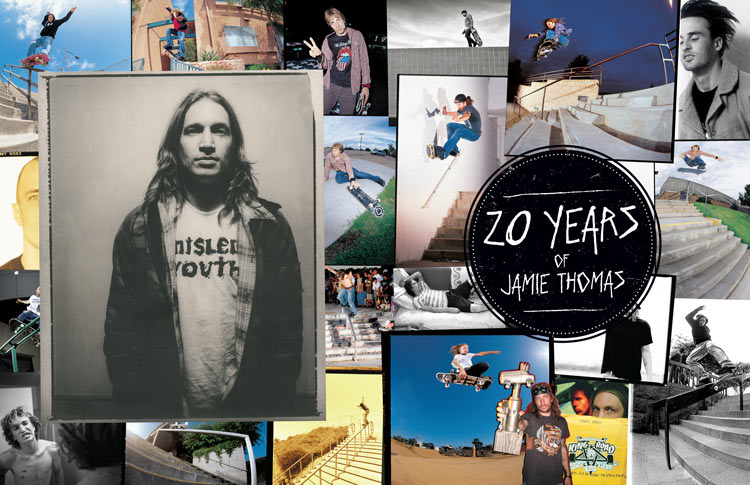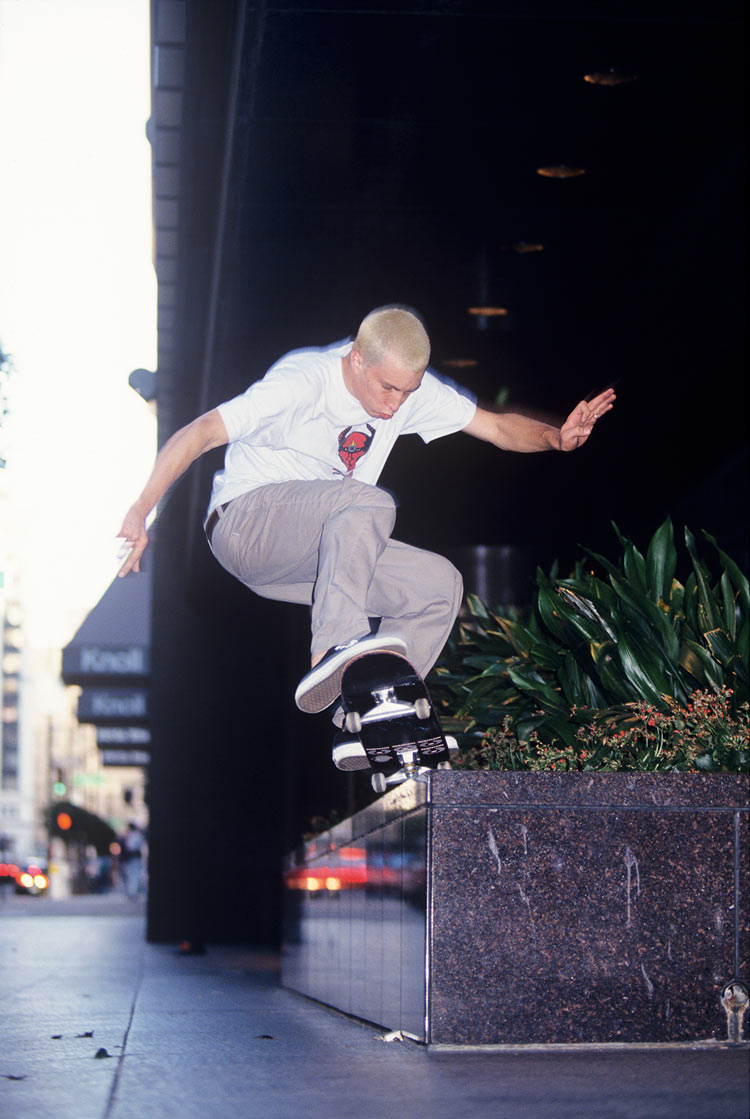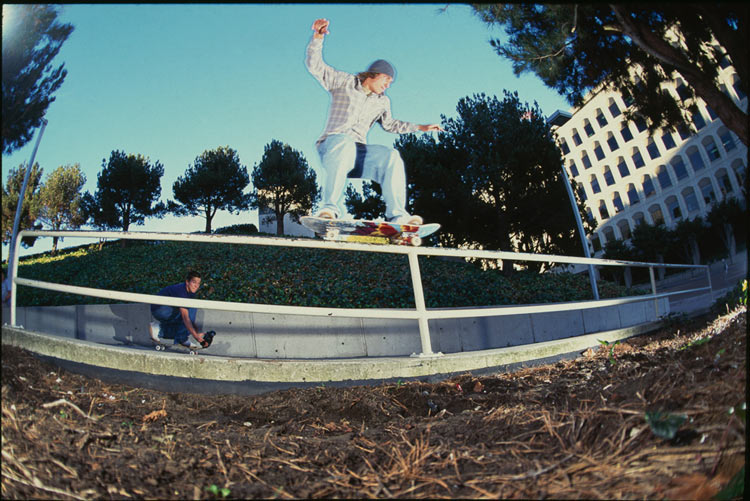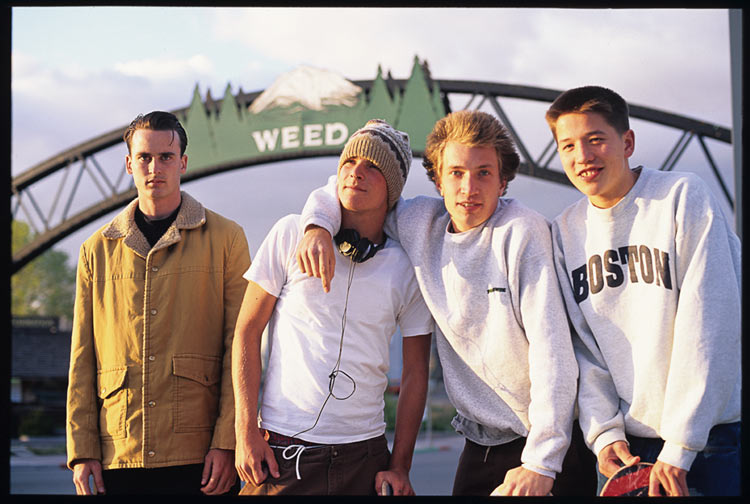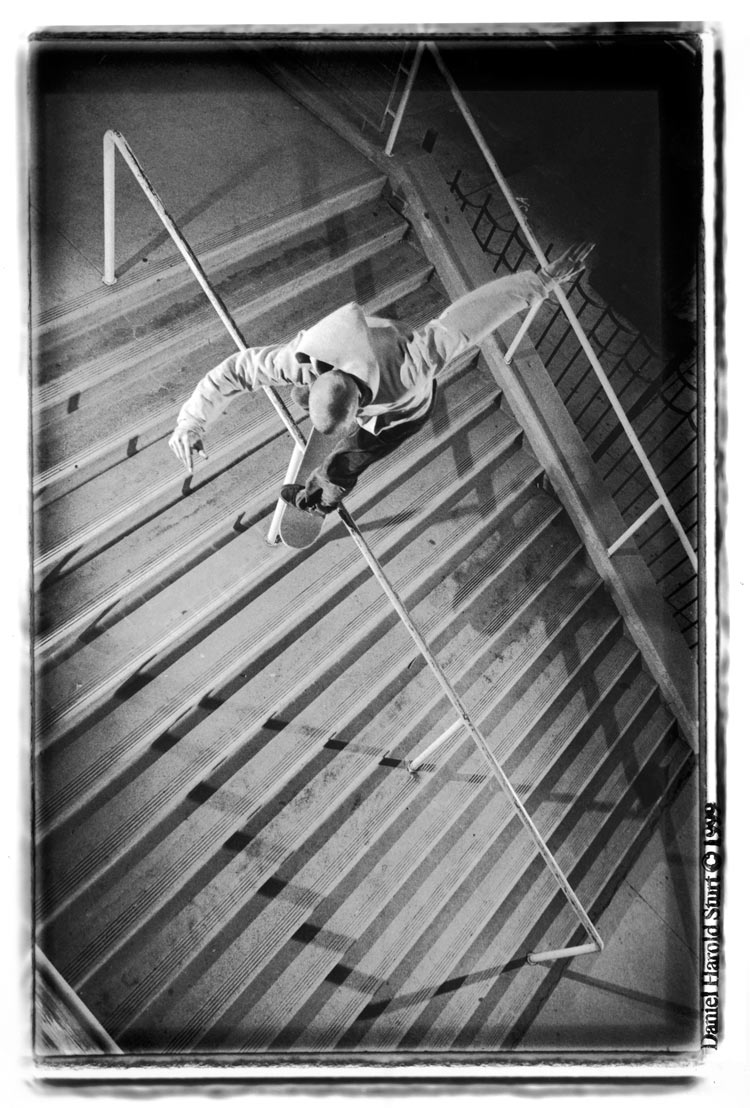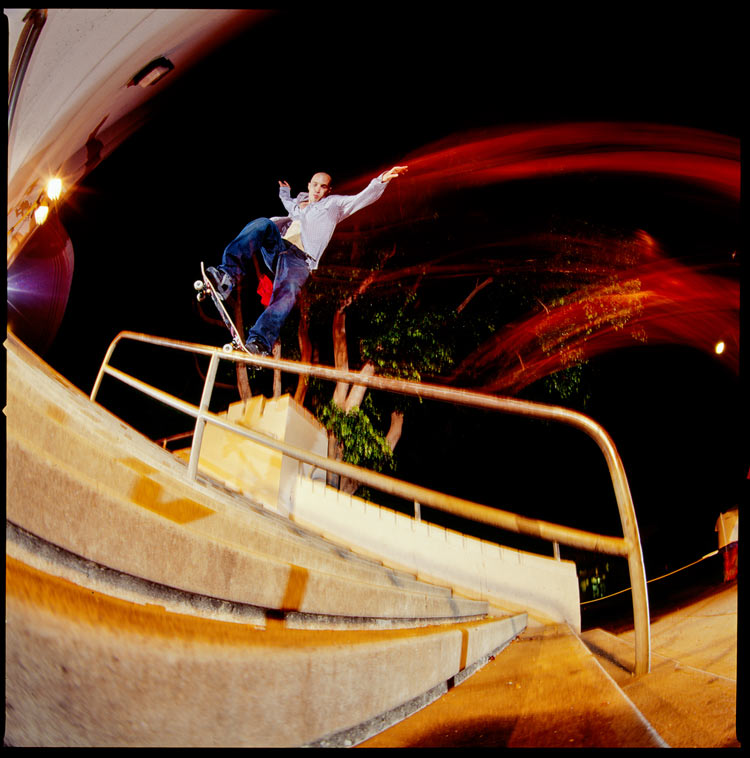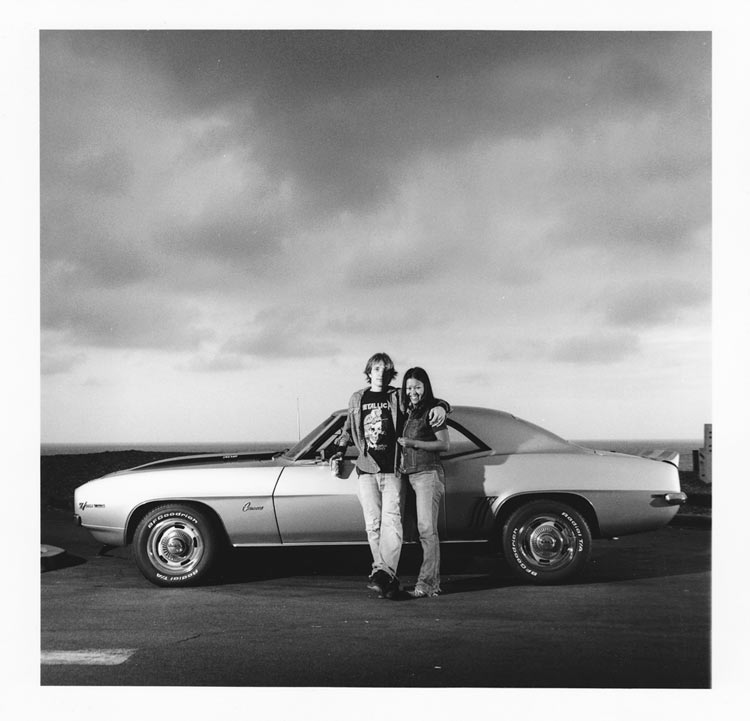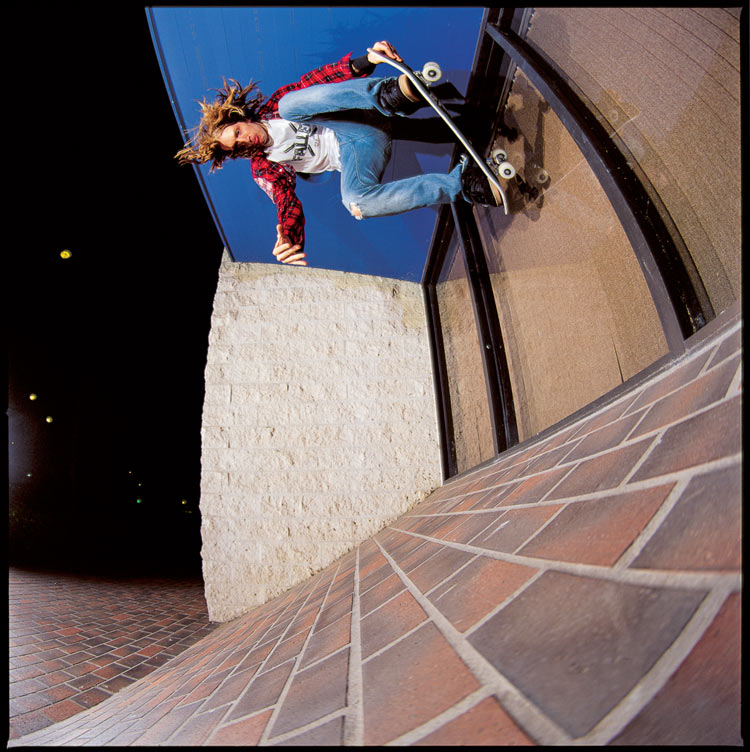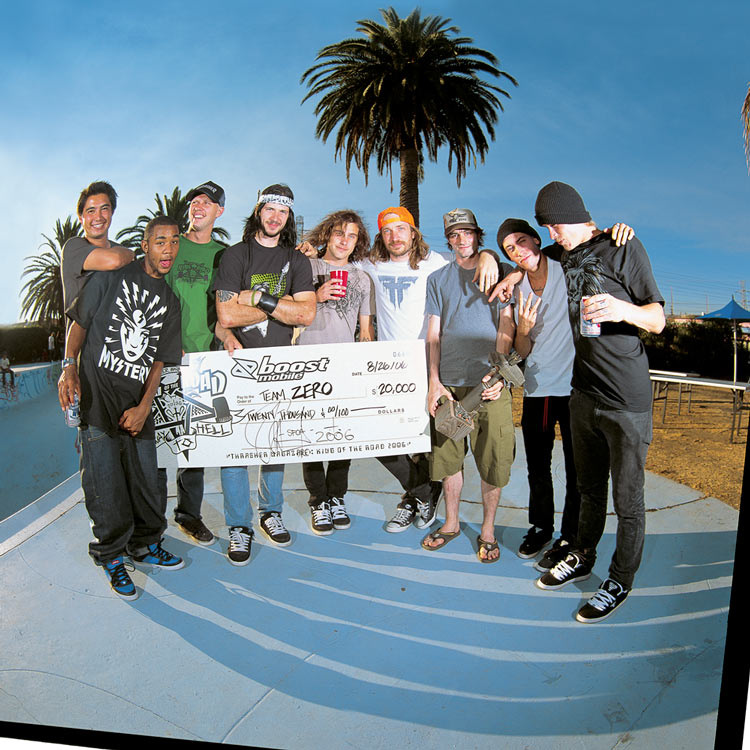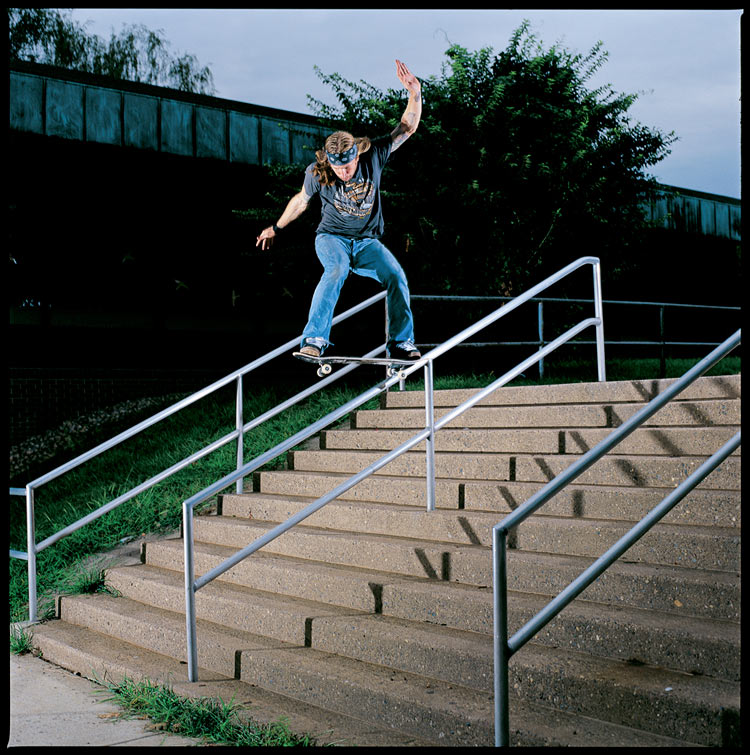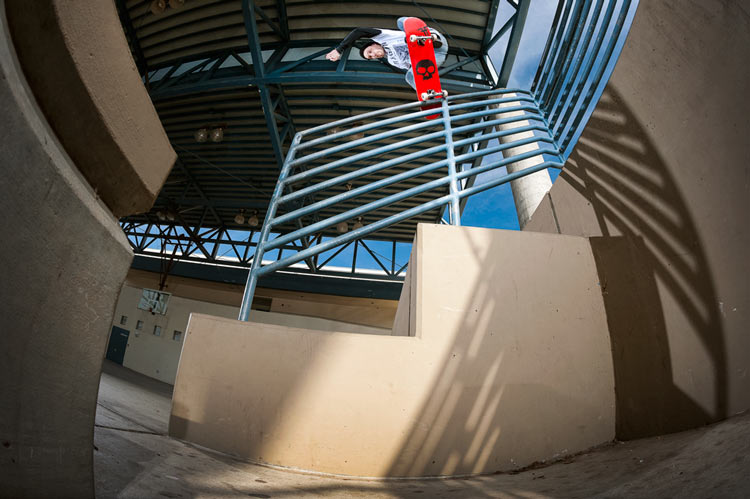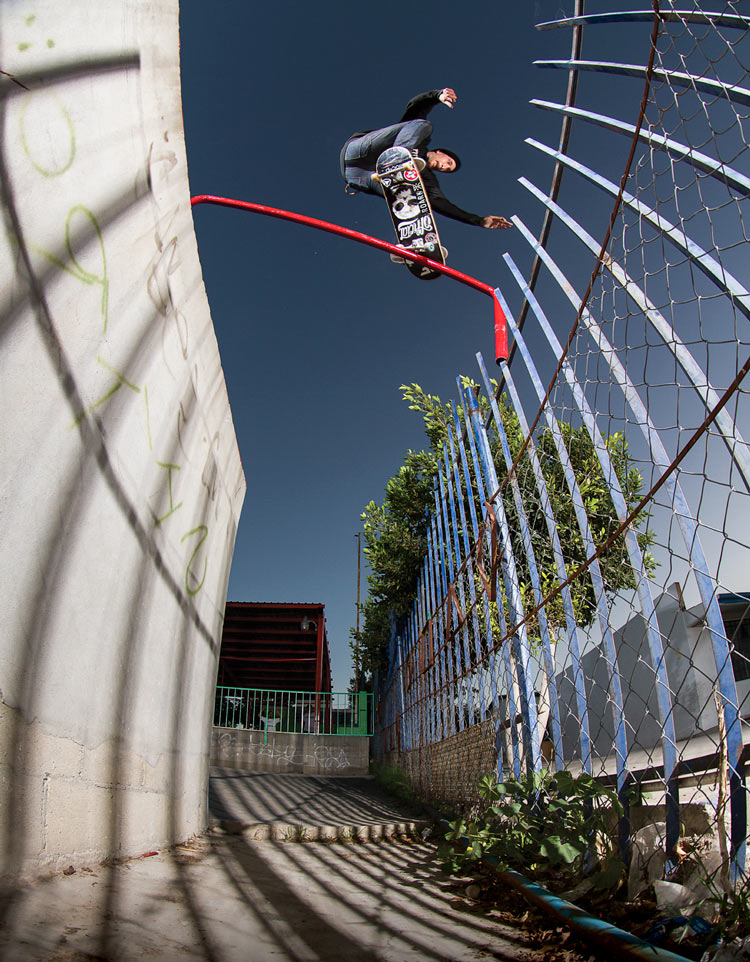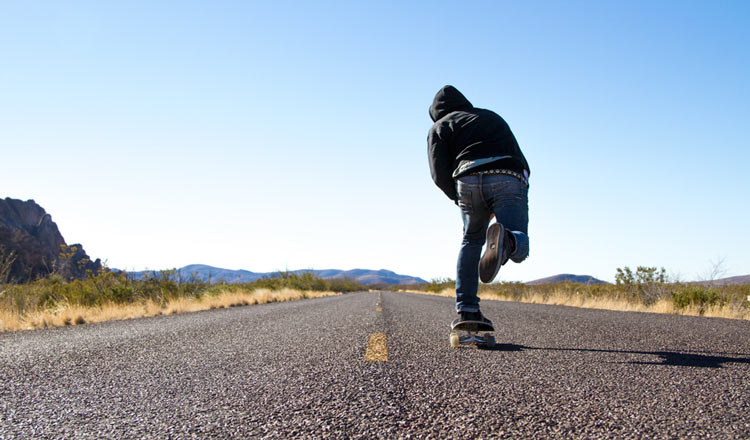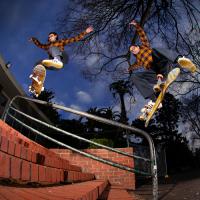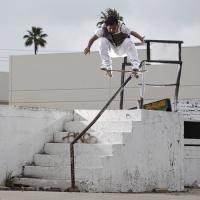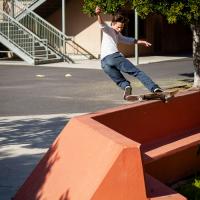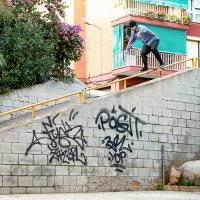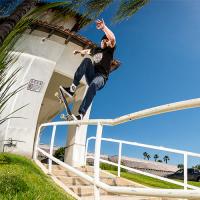20 Years of Jamie Thomas
Jamie Thomas has defined himself by struggle.
When everyone was fresh, he was hesh… and dirty… and lived in his car. Be it the cool clique at Embarcadero, the fickle skateboard industry, the tenets of acceptable maneuvers or three King of the Road trips, Jamie has put a shoulder into it, charged forth teeth gnashed and ultimately conquered. Even when he was at the top of the mountain, lording over a building longer than a city block, when asked how he was doing he’d always say, “Oh, man. It’s tough. It’s really tough.” Which is just how Jamie Thomas likes it. In fact, let him get one more try at that gigantic 5-0. It’s easy to forget that skulls, acid drops and balls-to-the-wall shredditude were on the wane before Jamie’s Zero army. It’s hard to imagine that Chris Cole was stuck with the goof troop before the Chief gave him a shot. There’s so much of modern skateboarding that we take for granted that is either wholly or partially thanks to Jamie Thomas’s struggle; his vision of what makes skateboarding awesome. So when we hear rumors that Zero is downsizing or that Jamie is having knee problems we aren’t one bit concerned. In fact, we know that it’s probably just how he’d prefer things. The struggle is real, and Jamie Thomas fucking lives for it.
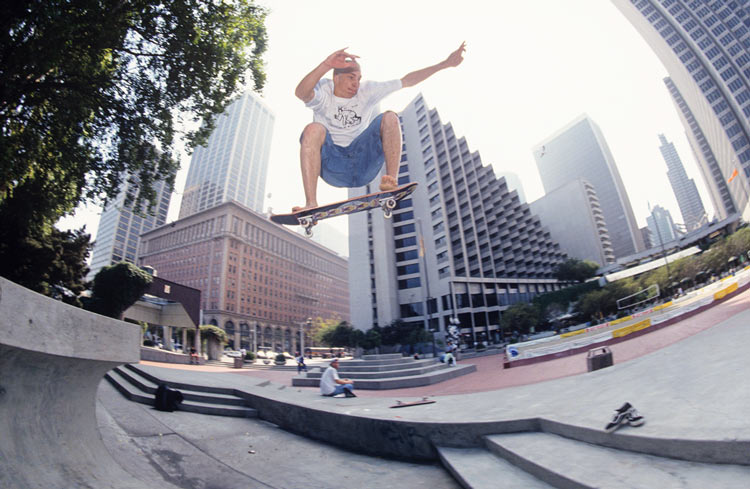
 What did you think moving to SF to skate was going to be like before you got there?
What did you think moving to SF to skate was going to be like before you got there?
I moved to San Francisco in 1992 and was there for almost two years. I grew up in Alabama and before moving to California,
I had only traveled around the South where skateboarders are an extreme minority, so just being a skateboarder was enough to be accepted by other skaters. So, I guess it’s safe to say that I expected to be accepted.
What was it really like?
It was the exact opposite of what I expected. We felt like outcasts. We got along with other out-of-towners, but it was pretty harsh trying to integrate into the scene.
What was your lowest point in San Francisco?
When we moved out there, we planned on camping out at Embarcadero until we figured something out, but we didn’t really think that through. Sean Young and I skated everyday and weren’t showering very often and eventually we got staph infection, then I got strep throat on top of that. I remember sleeping in my car and just shivering for days. Eventually, we went to the free clinic. We got a penicillin shot and the doctor told me the only way I was gonna get off the street was male prostitution. Meanwhile, we felt hated by the locals and I remember asking myself, “What the hell am I doing here?”
Hensley haircut, 180 nosegrind when there was still marble to skate in SF: Kanights
What did skateboarding feel like at that time?
I couldn’t understand how something that I loved so much could feel so lame. I wanted more than anything to belong to the skate community and the harder I tried, the worse it was, so I just stopped trying and stopped caring what people thought of me. It was hard accepting the fact that I was a kook or that everyone thought so. Whenever I would get really discouraged I would play the tape through and think about what would it be like if I went back to Alabama. I knew there was nothing for me there, so that wasn’t really an option. So it would get me fired up to make the most of every opportunity.

How did your time in SF affect your motivation and determination?
I think the struggle during that time helped mold and define me. I left Alabama with blind confidence and the drive to make something of myself, but after we got off the streets I started to focus on what I had to offer skateboarding and started to push myself. Once I started to get some coverage in the mags, that fueled the fire and motivated me. More than anything I was determined not to go home.
What were the biggest lessons your learned at that time in your life?
I learned that respect is earned not given and often times it might not be on your schedule. I also learned how important it is to be able to overcome adversity.
Satva on fish, pushing the limits of rail riding at the Moscone Center while filming for Welcome to Hell: Mcgrath
 How did you meet Ed Templeton?
How did you meet Ed Templeton?
That’s a good question. I don’t remember actually meeting Ed. Maybe it was at the Back to The City contest in ‘94? I rode for Invisible at the time.
How did riding for Toy Machine differ from your past sponsorship experiences?
The brands I’d ridden for in the past were pretty small and low budget, so I was just barely getting by. Even though Toy only had a few team riders when I got on, Tum Yeto was solid and I was able to support myself. I was also able to jump in and help with a few different roles.
What extra shit did you want to do with Toy that you hadn’t done before?
I wanted to do whatever needed to be done to make the brand rad. Even though Ed wanted stuff to happen, he often took a hands-off approach and waited for someone else to do it, so I stepped in and started doing shit: building a team, making videos, sending out packages, planning
trips, whatever.
Raw jocks—Ed, Muska, Jamie and Satva: Mcgrath
When did you realize you had a knack for the handrails and drops?
When I was really young I used to jump out of trees and off the house. I would literally do it for hours. Seems crazy now that I think back, but for some reason I loved it, so I learned how to fall. When I started skating I skated jump ramps and acid dropped off high stuff and eventually started skating rails. I realized that I had the ability to overcome fear and try stuff that others wouldn’t. I liked the feeling and I think I liked that it was my thing, so I just started ollieing every gap I could find.
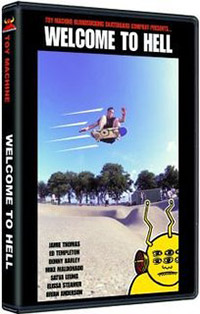
What was filming for Welcome to Hell like?
I felt like I was getting my groove and tapping into my potential as a skateboarder. I had a vision for the part and I had something to work towards. During that time I developed or honed my process for progression and learned how to film a part start to finish. It all started with finding the right song.
Was the competition between you and The Muska what eventually tore the Welcome To Hell Toy lineup apart?
I wasn’t really tripping on competing with Chad, but he was the rising star and his persona was larger than life, so when he got hurt during the last six months of filming he was really frustrated and the tension started to build. I wasn’t gunning for his spot because we were so different, but we were the same stance and had a knack for similar tricks, so if I learned or filmed a trick that he was good at or that he didn’t have for his part, he would get pissed. I understand why he was frustrated. It was his time and the stage was set for him to have last part, but due to things out of his control he had to sit on the sidelines.

Did you feel like you were starting to be where you wanted to be as a pro skater after Welcome To Hell, as far as respect from your peers, admiration from fans, satisfaction with your skills, etc?
I didn’t really think about it that much, I was so focused on what’s next. I do remember thinking every once in a while, “How did I get here? A few years ago I was on the streets and felt banished,” but I didn’t dwell on it because I think I knew that I still had a lot of work to do.

What was the ethos of Zero skateboards? What did you want it to represent?
I started Zero in 1996 and at the time the graphics and gear that everyone was wearing felt bland. I remember feeling desperate for something that was against the grain. I wanted to go back to the ‘80s when I discovered rock ’n’ roll and punk rock, so that was the vibe. I also only wanted to sponsor underdogs; dudes that were hungry and wanted a chance. Maybe it was a way to help people that were in a similar situation to me when I got
to California.
What was your strategy or vibe as far as building a team? What were some of your earlier successes as far as team building?
Well, I helped Ed build the Toy Machine team, so that was my first experience. But when we started Zero I wanted it to be a bit grittier and rough around the edges. We always used a team vote and whoever we were considering had to be able to travel with the team and get along with everyone and also contribute something. At the time we were building Zero, it was just kinda happening naturally. I didn’t really have a formula worked out. As time went on and I got more experience, I started looking for certain qualities from the first conversation or interaction.
How was it being the boss? Was it all you imagined?
Being the boss has its ups and downs. I think I work best when it’s on a small scale, like ten-15 people. I think I’ve always been a natural leader, so I never really strived to be the boss, it just kinda happened. When things are good, it’s rad. When things are bad, it’s on you to make it rad.

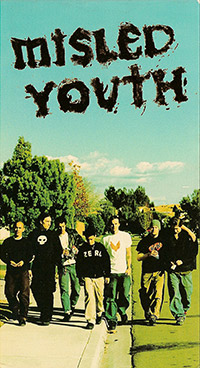 What were the highs and lows of working with Jim Greco?
What were the highs and lows of working with Jim Greco?
Jim was rad. He was always fun and so damn passionate. We never really had any lows ‘til the end. He quit for Baker by telling me he was gonna film a full part for Baker even though we were starting to film for the next video after Misled Youth. At the time, Baker was just a crew, but it was obvious to me it was going to be a board brand and I was, like, “You can’t film for another video over ours and still ride for Zero.” So he got drunk and quit in a shitty way. He later apologized, though, and we made good. I like Jim.
What Misled Youth tricks are you most proud of?
I try not to be proud, but I’m thankful for that part and times we had making that video. My favorite stuff in my part is probably the end section. I like the feel of the song with the tricks and it’s slow, so the nostalgia really has time to sink in.
Looking back, was this your greatest era as a pro skater or were you just getting started?
It’s hard to say. But, yeah, probably from 1996-2001 was when I was at my best. Ha! Hard to believe that I’m 14 years past my prime, but I guess that’s reality.
What defined you personally in this era?
Video parts defined me, straight up. Everything in my mind evolved around video parts.
After black hammers. Iconography. Back lip Hollywood 16: Sturt
 Is this when you found Jesus?
Is this when you found Jesus?
Yeah, but I wasn’t looking for Jesus. I was fine with everything being about me. But yeah, I went to Tim Brauch’s funeral and had a heavy realization that I was extremely selfish and I asked the Lord for forgiveness.
Why did you want to put Christian symbols on skateboards and grip tape? Did you ever catch heat? Why did you stop?
When I first accepted the Lord, I felt like it was my responsibility to share my faith. I was also so hyped on the Lord that I felt it was what best represented me. I felt like everything else was cheap or blasphemous, but yeah I got a lot of heat because people said I was trying to cash in on God. Ironically, before I released the graphics everyone told me not to do it because they wouldn’t sell and I felt so strongly about it that I did it anyways. When it comes to sharing your faith, you’re going to get hate because spirituality is so personal. No one wants their spiritual space invaded. Over time, I realized that everything I did didn’t have to advertise my faith or spirituality, so I started doing it more subtly.

Are you still a Christian? How does this manifest itself in your daily life? Do you ever make business decisions based on Christian beliefs at the expense of what will make you the most money?
Yes, I’m still a Christian. I go to church with my family whenever possible. That time helps keep me grounded and helps me acknowledge that my spiritual health is important. Yeah, I think that your spiritual health and upbringing is what defines your moral compass which gives you the ability to make ethical decisions. I’ve never made decisions solely based on what will make the most money. It’s funny because I’ve been accused of the opposite, but usually the person that has the most to gain from any decision is accused of being taking advantage of by the other person. No one usually asks my side of the story.
What does it feel like to have a teammate leave? Who was the hardest?
I guess when the feeling is mutual it feels natural. But like anything in life, it’s always harsh to be blindsided. I’ve been doing this for a long time, so I know the patterns that lead up to a rider leaving and generally there are warning signs. If you catch it early on, there’s a chance you can work through it, but more often than not the rider eventually leaves anyway. Ellington was only hard because I felt we worked really well together, but he’s really sharp and he was destined for more. Generally, the more you go out on a limb for a rider and try to do everything you can to help them on their path, the more it hurts. So, you can either give only what you’re comfortable with or do everything you can regardless of the pain you’ll feel if it doesn’t work out. I must be a glutton for punishment, ‘cause I usually pick the latter.
Are you afraid of the dark? Nosegrind in the era of the night mission: Blabac
A lot of people have tried to mess with you over the years. Do you love the haters, like DGK? How do you deal with criticism?
I learned early on that you have to find motivation from those that try to bring you down. “Those that can’t break you, somehow help make you.” Didn’t Morrisey say that? I think criticism is important for growth, usually the more painful the more you have to learn and possibly grow from.
Why do you engage with the Slap message-board weirdos?
Because it’s a community of skate nerds that I can identify with. Once you understand the message board culture and the creed, then you’re able to find the good in it. I realize it’s not for everyone, though.
After skating so much giant terrain, where did you want your skating to go?
I didn’t really think about it. I just wanted to go as far as I could with every trick I learned.
Did you “Duffy” yourself—i.e. come out so strong that it was hard to outdo yourself later?
Nah, it’s hard to maintain that level of focus or physical ability, though, ‘cause of the injuries that come with it and because life’s responsibilities continue to increase.
What went wrong on the Leap of Faith?
I didn’t go fast enough for the height of the drop. It was hard to imagine going faster, though. I felt like the most important thing was to make sure I landed on the board. I always wanted to go back, but it never happened.
Jamie and Joanne, 4 ever: Brook
Did you actively try to market this event or was this something created solely by the media?
We just made an ad for it and put it in the video, but I had no idea the way people would respond to it. And to be honest,
I think it gained notoriety when the dude broke his legs trying it. I didn’t see
that coming.
What were the most important things that happened in your life in these years?
I think up to this point, moving to SF, riding for Toy Machine, starting Zero, getting married, and giving my life to the Lord were the most important things that happened. Everything else was a byproduct of those decisions.
Heart of glass wallride from his 10 Years of Thomas cover: Shigeo
 What made you want Chris Cole for Zero?
What made you want Chris Cole for Zero?
I felt he had more potential than anyone I’d ever seen and he was so passionate about skating. I knew he had a different style to the brand, but I thought that he was rad and he seemed to be growing into his own.
How would you describe him before Zero?
He was a super talented skate nerd from the East Coast who was a product of
his environment.
Did you really give him a cool makeover, as cynics suggest?
Nah, we went on Circa trips and when he was wearing bright yellow and red shirts the thought of him riding for Zero never crossed my mind. But as he started to outgrow his bright phase and started gravitating toward the Circa stuff I was designing, it started to not seem like such a far-fetched idea.
I roomed with him quite a bit ‘cause we had a lot in common. We liked a lot of the same music and we were the sober skate nerds.
You also helped groom Jon Allie and Tommy Sandoval for the big leagues. What’s your approach? How do you spot raw talent?
I look for the dudes out there filming video parts with their homies and putting everything on the line like they’ve got nothing to lose. If they can do that on their own, they’ll progress that much more with help and support.
What were the challenges and victories in working with Cole, Allie and Tommy?
I think the challenges were different for each dude: Cole’s challenge was acceptance from the team and his peers because of his radical transformation. Allie’s was his crass introverted personality and Tommy’s was that he’s so raw and ghetto. All of those challenges worked to their advantage, though, and became what people loved about them. The victories came from watching the impact they had on skateboarding and the good times we had.
When has Zero felt most like a team?
In the beginning. When things are small is when I’ve found every brand feels most like a team, but videos really bring the team together. But after videos are over you’re often left with an emptiness and an almost depressing feeling.
Who is your closest friend from Zero?
I talk the most often to Ellington and Lopez, so probably one of those two.
KOTR champs, undefeated: Shigeo
What allowed Zero to win KOTR an unprecedented three times?
It seems like we had a formula worked out. Everyone knew their role and we gave everything 110 percent. Even though we often hated it, we had a team of scrappy underdogs that seem to thrive on being put in those situations.
What do you love and hate about KOTR?
The anxiety of feeling like there’s more you could be doing and that you can’t relax. There’s also a stress level of knowing that no matter what you do you can’t beat the book. Every year we tried so hard to beat the book, but damn if it wasn’t impossible.
Under what conditions would you ever go again?
I don’t know. I think that time has passed. I’m not sure I have that level of fight left in me. I don’t feel like there’s anything left to prove or gain.
In this period you had enormous success with Zero, Mystery and Fallen. Was there a moment when you realized, “Holy shit! I’m rich!”
Ha! By the time I realized that may be the case, things started getting tough with the economy and the thought was gone.
180 nosegrind, third times a charm: Shigeo
You were once named entrepreneur of the year and were rumored to have been offered many millions of dollars for Black Box. Why didn’t you sell?
I never got in this to get rich and all of the people that were offering to buy the brands were investment bankers. I just couldn’t imagine something that we cared about so much about being owned by someone who cared so little.

Do you ever regret not selling?
Not for my benefit. I think the tough times I’ve had have taught me a ton about humility and what’s really important in life. If I would’ve sold when we were on top, I’m afraid I’d forever be the worst version of myself. I do wish that the employees and team riders could’ve benefitted from a payday, though.
In your imagination, what do you spend your 50-million dollars on?
I would want to give a big chunk of it to all of the people that helped make it successful. I would give some to my family and to charities and invest the rest. I might be tempted to buy a shack in the South somewhere.
Cold War found Jamie back at Rincon for one more rodeo. Blunt slide: Perkins

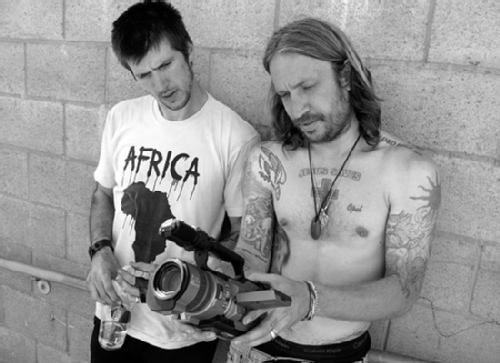 How hard was it to part ways with Cole? What do you think about the direction his post-Zero career has taken?
How hard was it to part ways with Cole? What do you think about the direction his post-Zero career has taken?
To be honest, I think the timing was right. His career was headed in a different direction than where Zero is headed. We weren’t really talking that often or spending time together any more, so it made sense. I’m hyped for him. His commercial success is huge and I don’t feel any weirdness besides when kids get all upset about the fact that he’s not on Zero anymore and want to vent their frustration towards me.
What do you look for in a friend, business partner and team rider? Can you reciprocate?
I look for someone that as a team you make each other better. Yeah, I think you should be there to back each other up.
How would you describe your intensity? Have you ever looked at yourself and said, “Man, I’m a maniac. I need to slow down…”
Maybe in my earlier years, but I’m not so intense these days. I’ve mellowed out; gotten softer.

Do you think you burn people out? Who can keep up with The Chief?
I think I have that potential. I have to remind myself that not everyone shares my desire for the end goal.
Have you ever been burnt out? How do you reinvigorate?
Yeah, I get burnt out almost everyday, but the next day I’m ready for more. I hang out with the family when I’m burnt out on work or skating. I think I’ll continue to mellow out as I get older, ‘til I’m in a rocking chair whittling sticks.
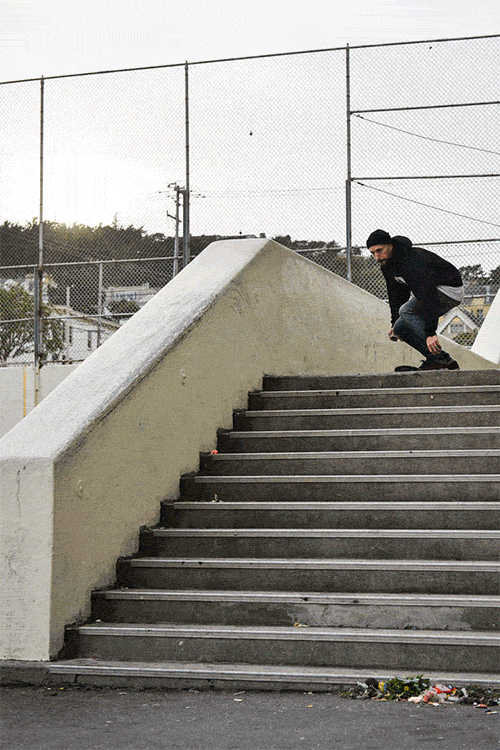 Old dog, old trick, gnarly terrain—impossible 50-50 at Clipper: Zaslavsky
Old dog, old trick, gnarly terrain—impossible 50-50 at Clipper: Zaslavsky
What have been the biggest physical challenges of your career? Are there any injuries we never even heard about?
Nah, no secrets. My knee injuries have been the hardest to overcome, starting with my first ACL blowout in 1999.
How does your family fit in with your very active life? Do you want your sons to skate? Do you expect them to be exceptional?
Travel is hard on any family, but I do my best to keep things balanced. I just have to try and stay organized. Nah, my kids are into organized sports ‘cause all of their friends are. It’d be rad if they were into it, but I don’t mind that they’re not. I just want them to be happy and to find something they love. I don’t expect them to be exceptional, but I expect them to make an effort to be their best.
Taking drops ‘til he drops. The sidewalk never ends for Jamie Thomas: Dominick
 What was your motivation for starting more brands, Fallen, Mystery etc.? Describe what it was like to see your business shit the bed.
What was your motivation for starting more brands, Fallen, Mystery etc.? Describe what it was like to see your business shit the bed.
I think for better or worse, I’ve tried to make the most out of every opportunity. Unfortunately, though, it took me a long time to figure out that you don’t have to follow through with every “good idea” you have. The ability to stay focused and stay in your lane is something that I’ve had to learn. I guess I just had to learn my limits; I think that’s always been the case. Shutting Black Box down was tough; I had to say sorry to a lot of people. Fallen grew really fast and shrank at the same speed. When any brand has that type of trajectory, it’s hard to make it out alive. The hardest part is the toll it had on of all of my work relationships. It’s been like going through a divorce. I obviously wanted to keep Zero & Fallen going, so I had to try and find a home where they would be stable in hopes that they could start growing again. Dwindle has been exactly that. I miss the camaraderie with everyone at Black Box, but I don’t miss the responsibility that goes along with running a distribution.
What’s your role for Zero & Fallen now?
I’m the owner/creative director and we set up a little design studio in Encinitas and I work with three others on all of the creative and marketing aspects of the brands. Dwindle handles all of the sales, manufacturing, and distribution responsibilities. It’s a much healthier environment for me, personally.
Were you more interested in business or more interested in making cool stuff for you and your friends and fans and growing your Zero vision?
I never cared about business. It was just something you had to deal with in order to progress, and making cool stuff was the whole reason I was doing the brands. Ironically, though, the more the business progressed the less time I had to design stuff and work with the team.
Did you ever want to throw in the towel and become a motorcycle mechanic?
I thought about stuff like that, but I didn’t really see it as an option to give up. I wouldn’t be able to live with myself, knowing that I didn’t try everything.

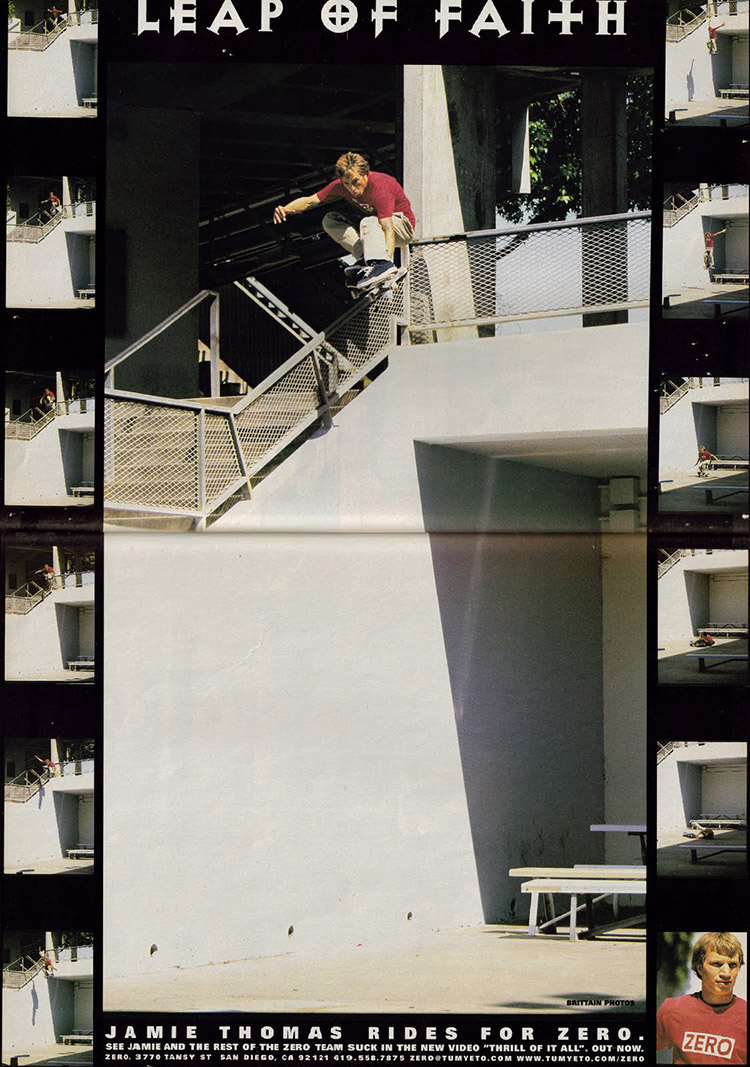
Describe what it was like to pick up the pieces and rebuild.
The fallout, cleanup and effect it has had on personal relationships is the hardest part. I’m still working through it. Working on new products and staying on task has actually been fun. It feels how it did when we first started—no expectations but hoping for the best. I also get to work with the team a bit more and talk to shops more.
When were you happiest?
Things were pretty blissful before I started a distribution company. Just driving around with the team trying to film tricks for Misled Youth.
When were you most naive?
1992.
When were you skating your best?
1999.
What was your gnarliest rail? Highest drop? Best trick?
My gnarliest rail was probably the backside 50-50 down the 21-stair in Welcome To Hell or the frontside 50-50 the Earl Warren 20 in Dying to Live. Biggest drop was definitely the Leap of Faith and my best trick was probably the impossible 50-50 down Clipper.
Who will always be the best?
John Cardiel, hands down.
When is skateboarding fun?
When you forget where you are and what you’re doing.
When is skateboarding miserable?
When you thought you wanted to try something and you have multiple filmers and a photographer waiting for you to try something gnarly and you’d rather be anywhere in the world but there.
What’s next? Why do you want to skate across Texas?
My sister and father have recently battled cancer and I want to do something that helps people like them, so I’m skating across the state of Texas to raise money and awareness for cancer.
Who gives you hope for the future?
My children.
Who on your team can always lift your spirits?
Dane. Even when I’m pissed at him I love him.
Who on your team puts you in check?
Brass. That’s his role. He puts everyone in check.
What pro skater bowed out most gracefully?
Heath, hands down.
How do you want it to end?
Does it have to end?
How do you want to be remembered?
As someone who dedicated their life to what they love.
Do you owe anyone an apology?
My wife.
In the end, what does it all mean anyway?
It’s about the Thrill Of It All.
Next stop: the Rio Grande!: Cannon
-
9/25/2023
The Follow Up: Adam Davies
Despite being a stand-up adult with staggering on-board talent, Adam Davies still has a healthy appetite for mischief. From staging a fake wedding, to sneaking onto forbidden roofs in China, Melbourne's emerging tech god opens up to Dave Chami about all the hijinx while filming his shocking new part. -
9/25/2023
Vitória Mendonça on Heelflips, Homies and Hitting the Big Show
The last few months have been huge for Vitória, from turning pro in Copenhagen to putting out a part for Element and making an appearance alongside some of the best in Abnormal Communication. Homie Emanuele Barbier calls up the rising star to talk about early skate exposure via Internet cafes, trick obsessions and the whirlwind lifestyle of a modern pro. -
3/08/2022
Spanky: 5 Greats
Baker’s art director, rad dad AND switch slappy savant, Spanky is a modern-day renaissance man, so of course his 5 Greats is full of gold. From wack trends to things Reynolds says, this one’s crucial reading—as seen in our Jan ’22 mag. -
12/28/2021
Kevin Bækkel's "Gangreen" Interview
Kevin put life and limb on the line for Creature's newest video. Catch up with Norway's gnarliest viking as he talks thwarted kidnappings, first impressions of the States and nonverbal communication mishaps. From our February 2022 mag. -
9/09/2019
Kevin Bækkel Interview
Willis Kimbel grills the gnarly Norwegian about getting punched by cops, prying a dude’s mouth open in the street, Viking bonfires and waking up in a pool of his own blood. Oh, and skating. There’s some skating in there, too. This one’s too funny.
